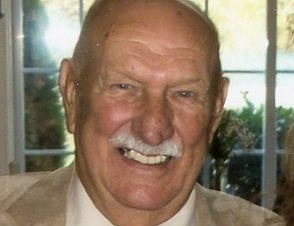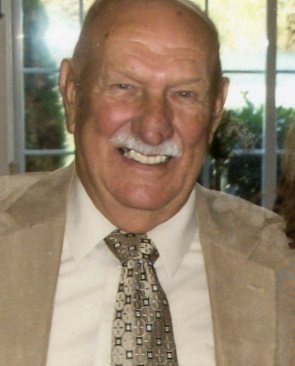For reasons not yet known, Dade County received a ballot for the Nov. 3 presidential election with Edward Zigmund Skwiot's name on it. Skwiot, a veteran of the United States Navy, died April 28, 2015, at his home in Trenton at age 82.
In the months following a contentious election, Secretary of State Brad Raffensperger and other top election officials in Georgia have repeatedly said there has been no evidence of widespread voter fraud in the 2020 presidential election. Nor were there any irregularities in the runoff that Sens. Jon Ossoff and Raphael Warnock won, election officials have said.
Dozens of court cases in Georgia brought by former President Donald Trump's legal team were dismissed by both Republican and Democratic-appointed judges.
However, no election process is without error. More than two months after it was discovered that a ballot with Skwiot's name was accepted Oct. 19 after an absentee ballot was requested Oct. 1, investigators still don't know how a ballot was cast in the name of a man who died five years ago.
Walter Jones with the Georgia Secretary of State's Office said this week there are no answers as to who may have submitted the ballot, and the public might not get an answer for years.
"Of the cases on the docket for the state election board to consider, I think there are some that go back to 2015 at least, 2016," Jones said. "Those are likely to stay ahead in the line."
Jones said a common occurrence with these types of cases is someone will eventually come forward and admit to making a mistake and mailing in a ballot they shouldn't have.
"A lot of them get resolved this way with essentially a consent agreement where the person says, 'OK, yeah I did it. Maybe I didn't realize it was wrong. It was a technical violation and I'll never do it again,'" Jones said. "Those sorts of things do get resolved, and the board won't hear each case."
Jones estimated about a third or a half of the cases the elections board hears when it comes to ineligible votes come down to this kind of resolution. Most of the time, Jones said, a relative or spouse is found to have made an error as opposed to a sophisticated plot to sway the election results.
Skwiot and his wife, Doris, lived in Trenton up until Skwiot's death in 2015.
Michael Bell, Doris' son, lives in East Ridge. Doris lived at the house for about a year after her husband's death and then sold the house on Bell Circle in Trenton - the house where the mail ballot was sent.
Doris Skwiot now lives in Catoosa County.
"We don't know what to believe," Doris Skwiot said. "It's a curious thing. There had to be more of these cases. Only two? How did they come up with Ed's name? I haven't had any input from anyone at all since this occurred."
Doris Skwiot said she's largely been kept in the dark and believes her late husband's ballot is an example of a larger issue within the state's voting system.
She said it was hard seeing her husband's name and picture on TV after the election.
Even before the election, Trump cast doubts on the election process and warned of voter fraud connected to mail-in voting. As the results started to come in and when Trump's chances for another term started to fade, he alleged the election was rigged and being actively stolen from him as Democratic voters flipped states like Georgia in favor of Democrat Joe Biden, who won.
His accusations were rejected by elections officials, states, dozens of judges and eventually the U.S. Supreme Court. But he kept making his claims.
Other politicians fell in line - like Congresswoman Marjorie Taylor Greene of Northwest Georgia - and the dangers of stoking these false claims were on full display when Trump supporters stormed the U.S. Capitol on Jan. 6, demanding the election results be overturned.
Days before the insurrection that shook the nation, a recording of a phone call between Trump and Raffensperger was obtained by NPR and other news outlets. On the call, Trump seemed to have pressured Raffensperger and his office to "find" thousands more votes that would push him ahead of Biden in Georgia.
During the phone call, Trump alleged that thousands of dead voters had cast a ballot in Georgia.
"So dead people voted. And I think the number is in the - close to 5,000 people," Trump said on the call. "And they went to obituaries. They went to all sorts of methods to come up with an accurate number. And a minimum is close to about 5,000 voters."
Trump identified four specific problematic votes in Georgia shortly after the election, including Skwiot's.
Georgia officials debunked three of them, finding that other people with similar names had voted.
For instance, the Trump campaign said a deceased James Blalock had voted in November. An Atlanta-area TV station found Blalock's widow had voted using the name on her voter registration, Mrs. James Blalock Jr.
At the time, Chris Arnt - the district attorney for the Lookout Mountain Judicial Circuit - announced an investigation into whether a ballot had illegally been cast for Skwiot.
On the call with Trump, Raffensperger said two illegal votes on behalf of dead people have been confirmed, not thousands as Trump alleged.
"The actual number was two. Two. Two people that were dead that voted. And so that's wrong," Raffensperger told Trump.
Jones confirmed that Skwiot was one of the two cases Raffensperger was referring to, but couldn't identify the other one.
Arnt told the Times Free Press this week that the case is still being investigated and not much progress has been made. Sgt. Hailey Smith with the Dade County Sheriffs Office said her office is not working an active case on the Skwiot vote and has handed it off to the Secretary of State's investigation team.
It's not clear how Trump and his team got the number of 5,000.
"The allegations that came out of the Trump camp was that there was some sophisticated organization that was mining the obituaries for names of dead voters and impersonating them and casting ballots for them," Jones said. "We haven't seen any evidence of that."
Contact Patrick Filbin at pfilbin@timesfreepress.com or 423-757-6476. Follow him on Twitter @PatrickFilbin.

